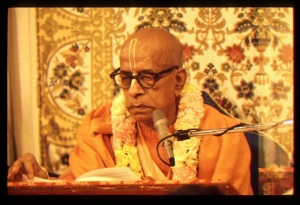CC Madhya 25.54: Difference between revisions
m (1 revision(s)) |
No edit summary |
||
| Line 1: | Line 1: | ||
{{ | [[Category:Sri Caitanya-caritamrta - Madhya-lila Chapter 25|C054]] | ||
<div style="float:left">'''[[Sri Caitanya-caritamrta|Śrī Caitanya-caritāmṛta]] - [[CC Madhya|Madhya-līlā]] - [[CC Madhya 25|Chapter 25: How All the Residents of Vārāṇasī Became Vaiṣṇavas]]'''</div> | |||
<div style="float:right">[[File:Go-previous.png|link=CC Madhya 25.53|Madhya-līlā 25.53]] '''[[CC Madhya 25.53|Madhya-līlā 25.53]] - [[CC Madhya 25.55|Madhya-līlā 25.55]]''' [[File:Go-next.png|link=CC Madhya 25.55|Madhya-līlā 25.55]]</div> | |||
{{CompareVersions|CC|Madhya 25.54|CC 1975|CC 1996}} | |||
{{RandomImage}} | |||
==== TEXT 54 ==== | ==== TEXT 54 ==== | ||
<div | <div class="verse"> | ||
:'vedānta'-mate,-brahma 'sākāra' nirūpaṇa | |||
:'nirguṇa' vyatireke tiṅho haya ta' 'saguṇa' | |||
</div> | </div> | ||
| Line 12: | Line 16: | ||
==== SYNONYMS ==== | ==== SYNONYMS ==== | ||
<div | <div class="synonyms"> | ||
vedānta- | ''vedānta-mate''—according to Vedānta philosophy; ''brahma''—the Absolute Truth; ''sa-ākāra nirūpaṇa''—established as the Supreme Personality of Godhead, a person; ''nirguṇa''—without material qualifications; ''vyatireke''—by indirect explanations; ''tiṅho''—the Supreme Personality of Godhead; ''haya''—is; ''ta'' '—indeed; ''sa-guṇa''—fully qualified with spiritual attributes. | ||
</div> | </div> | ||
| Line 19: | Line 23: | ||
==== TRANSLATION ==== | ==== TRANSLATION ==== | ||
<div | <div class="translation"> | ||
"According to Vedānta philosophy, the Absolute Truth is a person. When the word 'nirguṇa' ['without qualities'] is used, it is to be understood that the Lord has attributes that are totally spiritual. | |||
</div> | </div> | ||
__NOTOC__ | |||
<div style="float:right; clear:both;">[[File:Go-previous.png|link=CC Madhya 25.53|Madhya-līlā 25.53]] '''[[CC Madhya 25.53|Madhya-līlā 25.53]] - [[CC Madhya 25.55|Madhya-līlā 25.55]]''' [[File:Go-next.png|link=CC Madhya 25.55|Madhya-līlā 25.55]]</div> | |||
__NOTOC__ | |||
__NOEDITSECTION__ | |||
Revision as of 02:58, 17 September 2021
Śrī Caitanya-caritāmṛta - Madhya-līlā - Chapter 25: How All the Residents of Vārāṇasī Became Vaiṣṇavas

His Divine Grace
A.C. Bhaktivedanta Swami Prabhupada
A.C. Bhaktivedanta Swami Prabhupada
TEXT 54
- 'vedānta'-mate,-brahma 'sākāra' nirūpaṇa
- 'nirguṇa' vyatireke tiṅho haya ta' 'saguṇa'
SYNONYMS
vedānta-mate—according to Vedānta philosophy; brahma—the Absolute Truth; sa-ākāra nirūpaṇa—established as the Supreme Personality of Godhead, a person; nirguṇa—without material qualifications; vyatireke—by indirect explanations; tiṅho—the Supreme Personality of Godhead; haya—is; ta '—indeed; sa-guṇa—fully qualified with spiritual attributes.
TRANSLATION
"According to Vedānta philosophy, the Absolute Truth is a person. When the word 'nirguṇa' ['without qualities'] is used, it is to be understood that the Lord has attributes that are totally spiritual.